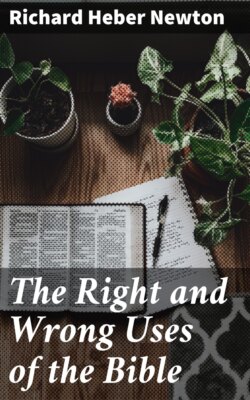Читать книгу The Right and Wrong Uses of the Bible - Richard Heber Newton - Страница 12
На сайте Литреса книга снята с продажи.
V. This theory is incapable of a statement which is not self-stultifying.
ОглавлениеTo be an infallible authority upon all the matters upon which it treats, a book must not only be guaranteed in its thought. Thought changes more or less in finding an expression. No two statements of an idea or of a fact can be exactly alike. There are no real synonyms. Interchangeable words have each a special shade of meaning. The guarantee must cover the phraseology of the original language in which the book is written. The words must be dictated to amanuenses. The thorough-going verbal inspirationists are the only logical defenders of infallibility.
But the guarantee would need to be pushed still further in the case of a book written as was the Bible. The best stenographers make mistakes in filling out their abbreviations and in distinguishing the similar signs which stand for very dissimilar sounds. Early Hebrew was a language of abbreviations. No vowels were used. Consonants stood alone, and their conjunction, aided by memory, was expected to suggest the proper vowel accompaniments. Vowel points were added to the written language centuries after the last book of the Old Testament was written.16 Their insertion demanded a guarantee, if infallibility was to be secured.
This guarantee must then have followed every copyist in the original tongues, every translation of the Hebrew and Greek into other tongues, every copyist in modern tongues through the ages before the printing-press, every printer, who, since Gutenberg, has issued a Bible—if we are to be absolutely sure of having an oracular and an infallible Book.
The Westminster Confession, indeed, seems to follow its theory through most of these lengths, and a Protestant Council in Geneva in 1675, with a magnificent courage of conviction, actually affirms this supernatural direction of the translators of the Bible. But such notions are of the same nature with the preposterous traditions of the Jews, as to the translation of the Septuagint; according to which, seventy elders, separated from each other, produced seventy versions, which, on comparison, "agreed exactly"; whereby men knew that the Scriptures were "translated by the inspiration of God." With such tales we must leave the theory they seem necessary to authenticate in the lumber-loft of superstitions.
